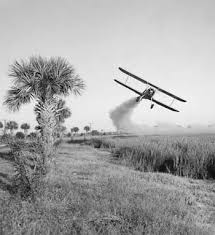Fifty years ago the Department of Agriculture and the
Department of the Interior used broad spectrum pesticides to try to eliminate
pests that damaged crops and were hurting our forests. They sprayed tons of DDT
from aircraft deployed systems. It did little to defeat the targeted species…as
they were already at work and had laid their eggs before being exposed, but the
environmental destruction was wide spread.
DDT was considered valuable because it was inexpensive to
manufacture, could be deployed easily, and had an extended life in the field,
which meant that it would work well over extended seasons and support reducing
target populations over longer periods than other pesticides.
Today DDT is not allowed to be used in the United States,
and most developed nations have banned it as well. It is, however, still used
in South America, Africa, and Asia to combat different infestations and to
reduce disease carrying pests that spread malaria and other infections.The US EPA removed DDT from service in the early 70s when it was classified as a probable human carcinogen by U.S. and international authorities. Specifically, DDT is:
- known to be very persistent* in the environment
- will accumulate in fatty tissues, and
- can travel long distances in the upper atmosphere.
 Using toxins for mass elimination of one or two insect
species proved foolish. There was no protection for the thousands of other
lifeforms exposed to these poisons, and many animals died along with the bugs.
Fish were effected, too, as the sprays blanked streams and lakes, along with
the land. Research today has found that there are DDT deposits in the beds
below our ponds, lakes, streams, and rivers.
Using toxins for mass elimination of one or two insect
species proved foolish. There was no protection for the thousands of other
lifeforms exposed to these poisons, and many animals died along with the bugs.
Fish were effected, too, as the sprays blanked streams and lakes, along with
the land. Research today has found that there are DDT deposits in the beds
below our ponds, lakes, streams, and rivers.
And though we can’t use DDT in the United States, we are
allowed to manufacture it for international shipments, which means that it is
being used in developing nations. Air deployed systems spray into the atmosphere,
and the result is that the fine spray often lifts to the clouds, delivering it
to far away regions the world over.
DDT isn't the only persistent organic pesticide of concern, there are many more being distributed and sprayed today in the USA and throughout the world. These products are primarily developed by the petrochemical industry, and they represent a major part of their market, and their profit. The necessary changes to regulations, for production and use, need to be enacted to counter the impact these toxins continue to have and the damage they are doing to our home (planet Earth).
Joni Mitchell may have said it best in her song "Yellow Taxi", "...give me spots on my apples, but leave me the birds and the bees!..."
DDT isn't the only persistent organic pesticide of concern, there are many more being distributed and sprayed today in the USA and throughout the world. These products are primarily developed by the petrochemical industry, and they represent a major part of their market, and their profit. The necessary changes to regulations, for production and use, need to be enacted to counter the impact these toxins continue to have and the damage they are doing to our home (planet Earth).
Joni Mitchell may have said it best in her song "Yellow Taxi", "...give me spots on my apples, but leave me the birds and the bees!..."
No comments:
Post a Comment